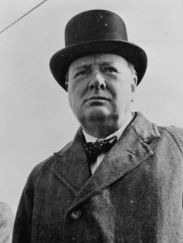The UK is marking the 50th anniversary of the death of
Winston Churchill. He is regarded by many as the greatest Briton ever,
but for some he remains an intensely controversial figure.
During Britain's darkest hours in World War Two, Churchill's leadership
was vital in maintaining morale and leading the country to eventual
victory over Nazi Germany.
TODAY marks the 50th anniversary of Winston Churchill’s death.
Generally
considered to be one of the greatest statesmen of all time, Sir
Winston, born in 1874, steered Britain through some of the darkest
times of the 20th century.
He suffered a severe stroke on January 15, 1965, and died on January 24 shortly after 8am in his London home.
He was 90 years old.
He
died with Lady Churchill, their three children and two grandchildren at
his bedside. It is believed that his beloved marmalade cat Jock was
sitting at the foot of his bed.
New of his death was given
to the media at 8.30 that morning, and within half an hour of the
announcement, silent crowds began to gather around Hyde Park Gate in
mourning.
Sir Winston’s death made headlines around the
world, with obituaries by world leaders, friends and former colleagues
filling the new bulletins and press.
The Times newspaper ran a front cover without adverts - the first time this had been done since World War One.
The
Queen paid tribute to Sir Winston, saying: “The whole world is poorer
by the loss of his many-sided genius, while the survival of his country
and the sister nations of the Commonwealth in the face of the greatest
danger that has ever threatened them, will be a perpetual memorial to
his leadership, his vision and his indomitable courage.”
By decree of the Queen, Sir Winston’s body lay in state in Westminster Hall for three days, visited daily by his widow.
For
many years, he had wanted to be buried in the grounds of his Kent home
Chartwell, but eventually had a change of heart and was laid to rest at
St Martin’s Church near Blenheim, close to his birthplace and ancestral
home.
The state funeral was held six days after Sir
Winston’s death, on January 30, and was watched live on TV by millions,
in Britain and abroad.
taken from http://www.kentnews.co.uk/news
BBC News - The 10 greatest controversies of Winston Churchill's career:
Winston Churchill. He is regarded by many as the greatest Briton ever,
but for some he remains an intensely controversial figure.
During Britain's darkest hours in World War Two, Churchill's leadership
was vital in maintaining morale and leading the country to eventual
victory over Nazi Germany.
TODAY marks the 50th anniversary of Winston Churchill’s death.
Generally
considered to be one of the greatest statesmen of all time, Sir
Winston, born in 1874, steered Britain through some of the darkest
times of the 20th century.
He suffered a severe stroke on January 15, 1965, and died on January 24 shortly after 8am in his London home.
He was 90 years old.
He
died with Lady Churchill, their three children and two grandchildren at
his bedside. It is believed that his beloved marmalade cat Jock was
sitting at the foot of his bed.
New of his death was given
to the media at 8.30 that morning, and within half an hour of the
announcement, silent crowds began to gather around Hyde Park Gate in
mourning.
Sir Winston’s death made headlines around the
world, with obituaries by world leaders, friends and former colleagues
filling the new bulletins and press.
The Times newspaper ran a front cover without adverts - the first time this had been done since World War One.
The
Queen paid tribute to Sir Winston, saying: “The whole world is poorer
by the loss of his many-sided genius, while the survival of his country
and the sister nations of the Commonwealth in the face of the greatest
danger that has ever threatened them, will be a perpetual memorial to
his leadership, his vision and his indomitable courage.”
By decree of the Queen, Sir Winston’s body lay in state in Westminster Hall for three days, visited daily by his widow.
For
many years, he had wanted to be buried in the grounds of his Kent home
Chartwell, but eventually had a change of heart and was laid to rest at
St Martin’s Church near Blenheim, close to his birthplace and ancestral
home.
The state funeral was held six days after Sir
Winston’s death, on January 30, and was watched live on TV by millions,
in Britain and abroad.
taken from http://www.kentnews.co.uk/news
BBC News - The 10 greatest controversies of Winston Churchill's career:



Δεν υπάρχουν σχόλια:
Δημοσίευση σχολίου